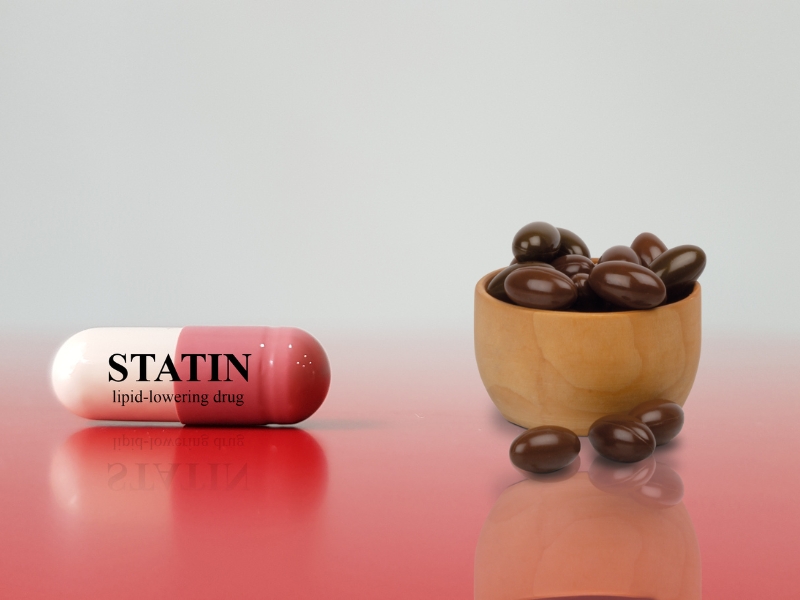More and more doctors are prescribing more and more statins. Statins do their work by blocking the activity in the liver of the enzyme HMG-CoA, an enzyme that facilitates the synthesis of cholesterol.
Statins and Q10 — same biological pathway
Now we know, from several human and animal studies, that taking statins also inhibits an important step in the body’s production of Coenzyme Q10. Dr. Richard Deichmann has summarized the studies that show that CoQ10 deficiency states can result from taking statins(1).
Taking statins has been associated with reduced levels of CoQ10 in blood serum and in muscle tissue. For example, a study published in the Journal of Clinical Pharmacology has shown that treatment with a statin preparation in a moderate dosage resulted in significantly reduced plasma levels of CoQ10(2).
Yes, statins are effective at lowering cholesterol levels. There is little doubt about that. But, in common with most prescription medications, statins do have side effects.
Muscle pain and fatigue
Whenever the body is synthesizing less CoQ10 and, as a consequence, is producing less energy at the cell level, then many people, especially users of statins, are going to feel some muscle pain and some fatigue that they otherwise would not feel. One plausible theory is that the reduction in the synthesis of CoQ10 caused by the use of statins and caused by aging places a limit on the amount of energy that can be produced in the cells.
CoQ10 as adjuvant therapy
Taking CoQ10 as an adjuvant therapy can help to ameliorate the muscle pain and damage caused by taking statins. In 2007, American researchers published the results of a study in the American Journal of Cardiology showing that regular intake of CoQ10 over a 30-day period had led to a reduction in muscle pain of up to 40% in patients taking statins(3). CoQ10 had made it possible for the patients to tolerate their statin medication better.
In a 2012 study, 20 athletes aged 50 years or older and taking statins were assigned, randomly, to a CoQ10 (200 mg daily) treatment group or to a placebo group for a six-week double-blind crossover study(4). When the older athletes were receiving the CoQ10 treatment, both their time to anaerobic threshold and the number of quadriceps muscle repetitions they could do were increased significantly.
Safety of CoQ10
Given 30 years of safe administration of CoQ10 in numerous clinical trials, and given the benefits of using CoQ10 to alleviate statin-induced muscle pain, it seems reasonable to augment with 200 mg of CoQ10 daily(1). It is best to take 100 mg of CoQ10 with meals, in the morning and at noon or in the evening.
The augmentation of the diet with CoQ10 would seem to be especially important for the following categories of people:
- elderly individuals whose bodies are producing less CoQ10
- individuals who are exercising actively and have greater demands for the CoQ10 in the production of ATP
- individuals taking statin medications
But anyone with a busy and stressful life should be taking a daily CoQ10 capsule with a formulation that has been shown to be well absorbed.
Sources:
- Deichman, R. et al. Coenzyme Q10 and Statin-Induced Mitochondrial Dysfunction. Ochsner J. 2010, Spr; 10(1): 16-21.
- Ghirlanda G, et al. Evidence of plasma CoQ10-lowering effect by HMG-CoA reductase inhibitors: a double-blind, placebo-controlled study. J Clin Pharmacol. 1993 Mar;33(3:226-9.
- Caso G, et al. Effect of Coenzyme Q10 on Myopathic Symptoms in Patients Treated with Statins. Am J Cardiol. 2007;99(10):1409-12.
- Deichman, R. et al. Impact of Coenzyme Q10 on Parameters of Cardiorespiratory Fitness and Muscle Performance in Older Athletes taking Statins. Phys. Sportsmed. 2012, Nov; 40(4):88-95










My aunt is in her 60s. Her doctor has her convinced that she needs to take Lipitor.
And he assures her that it is safe. Meanwhile, I know that her fasting blood sugar levels are usually high when she gets blood tests. The more I read on the web, the more I wonder if she should be taking Lipitor. What do you think? I have told her to ask her doctor about Q10.